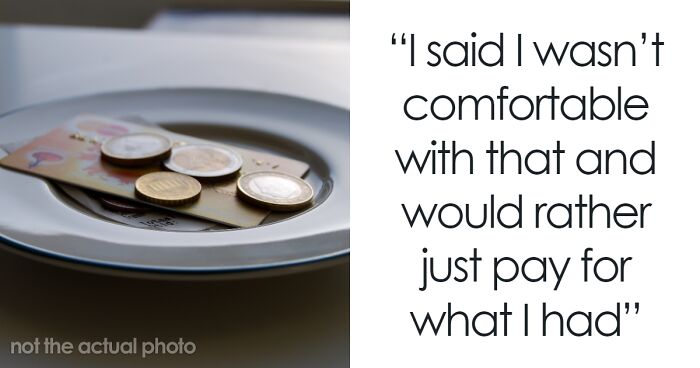
Woman Faces Backlash For Refusing To Pay For Expensive Meals She Didn’t Order
Interview With ExpertSplitting the bill evenly might seem like the most convenient option. However, it’s not always the fairest one, especially for those who are on a budget, drink or eat less than the rest, or are simply tired of covering friends’ cocktail-tasting habits.
When redditor y2kdreamxoxo was offered to share the cost of dinner equally among everyone, she firmly stood her ground and refused, as she barely ate anything. This didn’t sit well with her friends, who later accused her of ‘ruining the vibe’ in the group chat.
Scroll down to find the full story and conversation with world-leading etiquette expert, consultant and founder of EtiquetteExpert.Org, Jo Hayes, who kindly agreed to tell us more about splitting the bill evenly.
Splitting the bill evenly isn’t always the fairest option
Image credits: Valeriya Kobzar (not the actual image)
When this woman felt slighted, she made sure to stand her ground
Image credits: Jannissimo (not the actual image)
Image credits: y2kdreamxoxo
“As a general rule, it is not rude to ask to only pay for what one ordered, rather than splitting the bill evenly”
“As a general rule, it is not rude to ask to only pay for what one ordered, rather than splitting the bill evenly,” tells world-leading etiquette expert Jo Hayes to Bored Panda. “With the high cost of living, many people are operating on tight personal budgets. As such, they are very mindful about what they order at restaurants, and only order what they can afford. This is responsible personal budgeting.”
Meanwhile, those who ordered significantly more expensive meals and drinks shouldn’t feel slighted when the money-conscious person suggests splitting the bill equally, says Hayes. “If, however, everyone at the table orders about the same e.g., all share a bottle of wine and order the same type/standard of the meal (within, say, a few dollars of each other), it is polite to agree to split the bill evenly. Being finicky about a few dollars—which, in the grand scheme of things, is negligible—is considered rather cheap.”
When it comes to communicating about the desire to split the bill evenly, Hayes recommends being “kind but clear.” “If members of the dining group are clearly going for elaborate meals/drinks, while one is intentionally planning to order a simple meal/drink, verbalizing one’s intentions at the outset is often a wise move.”
Saying “I’ll just order something small,” is a great way to do it, she suggests. “This makes it clear to everyone that you’re not joining in on the elaborate meal—and thus, you paying only for your share, at the end of the meal, would not be seen as cheap or rude.
If, however, one gets to the end of the meal, and it’s clear one’s dining companions have ordered more than oneself—e.g., they’ve decided to order dessert and another round of drinks, while you’ve finished with the main—simply ask the question, “Are you right if we split the bill?””
Most well-mannered people would kindly agree and not expect others to pay for their access, Hayes notes.
Image credits: Yan Krukau (not the actual image)
Splitting the bill evenly can cost more than $1,560 a year
Certified financial planner Andrew Latham noted that splitting the bill evenly can eventually add up, which isn’t what money-conscious people really want. He did the math and reported, “Let’s say you go out with a group of four friends and the total bill comes to $100, splitting the bill equally means each person would pay $25.
However, if you only get a $10 salad but your friend gets a $40 steak, you will end up paying $15 more than your fair share. If you eat out twice a week, that is $1,560 a year.”
He additionally mentions that if the person is with friends who are drinking, this can amp up the amount even more. “Alcoholic beverages can significantly increase the cost of a meal, and splitting the bill equally means that non-drinkers end up paying more than their fair share. For instance, if a group of six friends goes out and two of them order cocktails that cost $15 each, splitting the bill equally means that everyone would pay an extra $5.”
Doing that a couple of times a week can add $520 to those $1,560 a year. This means that a person can spend more than $2,000 financing their friend’s meals and drinking habits.
A better approach for anyone who’s trying to save such a sum is to foot the entire bill with a credit card that rewards dining purchases and let the group repay with Venmo. This way the person can be reimbursed for the part of a purchase, which saves some money. Such a method can also take the pressure off when a server arrives with the bill instead of trying to hurriedly work out what every individual owns.
Personal finances are important, and more often than not, other people will feel the same about wanting to save a few bucks. Therefore, if someone feels uncomfortable paying for other people’s expensive choices, they should gather the courage to speak up. True friends will respect such a decision and be supportive of their friend becoming a responsible adult.
Image credits: ArtHouse Studio (not the actual image)
Some readers agreed with the author
Meanwhile, others not so much
Poll Question
Thanks! Check out the results:
Explore more of these tags
The YTA people are worthless moochers like OP's "friends". Every restaurant I go to asks if you want separate checks or not when ordering in a big group. It only makes sense to split the bill if everyone is ordering food to share and orders drinks similar in price. What ruins "the vibe" is alleged grown adults acting like others are required to subsidize their food.
Different cultures have different norms, both on the part of the customer and the restaurant. In Switzerland it's absolutely normal that the server will go round the table in turn charging each diner for their individual part, but I wouldn't expect that the world over. But yes, clearly anyone who wants to insist that the bill is split equally when one person objects is absolutely TA. Sometimes it's easier and fair to do so, but only if everybody agrees.
Load More Replies...In my country when people say splitting the bill (which is the norm) it means everyone pays for their food/drinks. Not "splitting into equal parts" which seems like a ridiculous idea as it will be unfair to those who don't drink or order no or little food.
That's how we always did it. Pay for your own and everyone put something towards the tip( I'm in US).
Load More Replies...I'm not paying $35 so you can eat because it's "easier" for you. Real friends are worth a couple of bucks? True, but real friends don't try to scam you, then complain that you didn't take the bait.
The YTA people are worthless moochers like OP's "friends". Every restaurant I go to asks if you want separate checks or not when ordering in a big group. It only makes sense to split the bill if everyone is ordering food to share and orders drinks similar in price. What ruins "the vibe" is alleged grown adults acting like others are required to subsidize their food.
Different cultures have different norms, both on the part of the customer and the restaurant. In Switzerland it's absolutely normal that the server will go round the table in turn charging each diner for their individual part, but I wouldn't expect that the world over. But yes, clearly anyone who wants to insist that the bill is split equally when one person objects is absolutely TA. Sometimes it's easier and fair to do so, but only if everybody agrees.
Load More Replies...In my country when people say splitting the bill (which is the norm) it means everyone pays for their food/drinks. Not "splitting into equal parts" which seems like a ridiculous idea as it will be unfair to those who don't drink or order no or little food.
That's how we always did it. Pay for your own and everyone put something towards the tip( I'm in US).
Load More Replies...I'm not paying $35 so you can eat because it's "easier" for you. Real friends are worth a couple of bucks? True, but real friends don't try to scam you, then complain that you didn't take the bait.

 Dark Mode
Dark Mode 

 No fees, cancel anytime
No fees, cancel anytime 







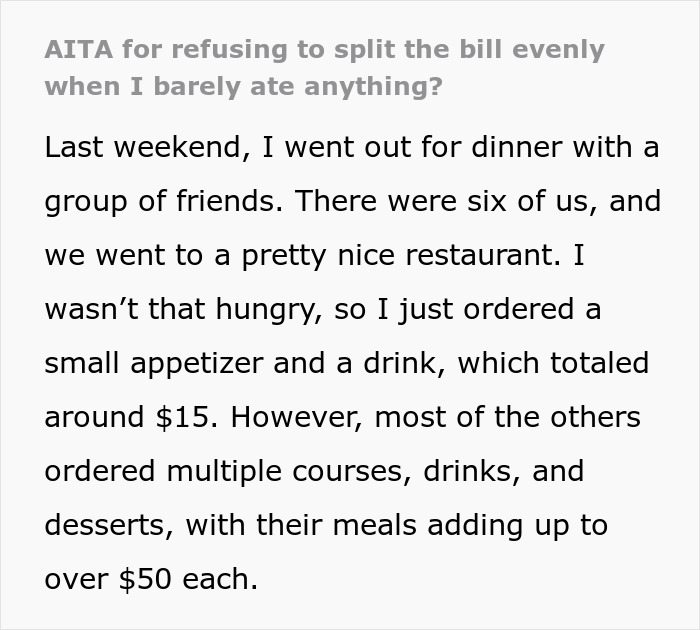
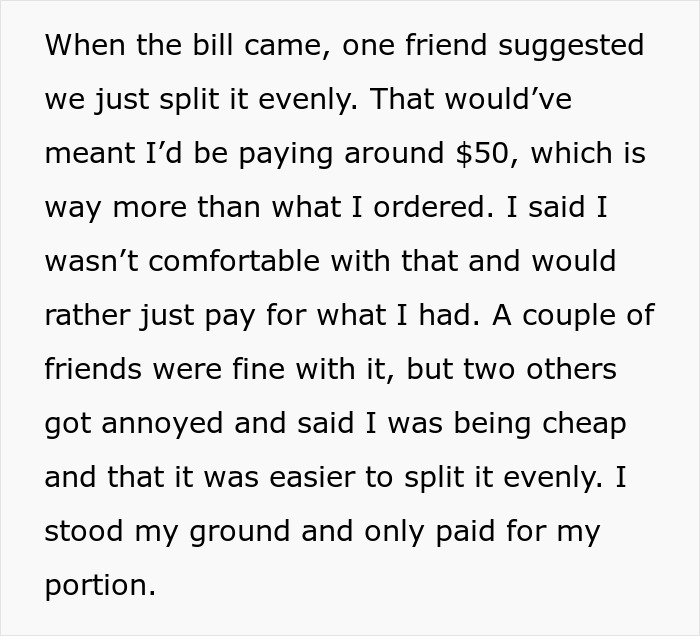
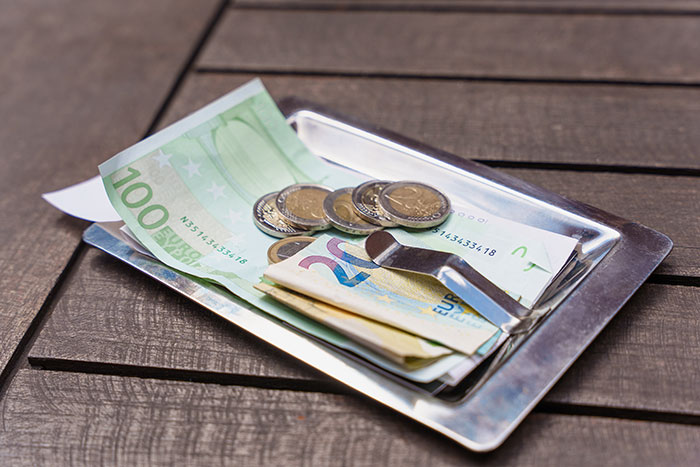
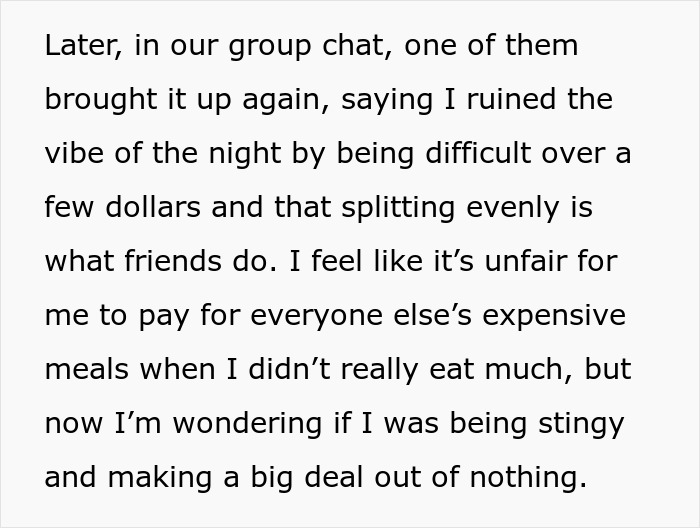
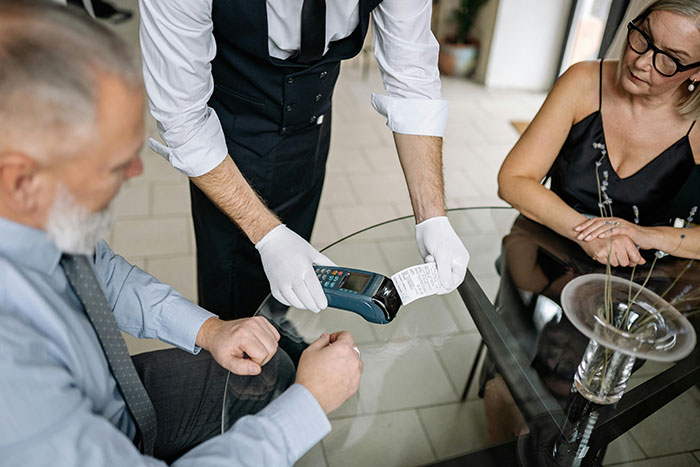

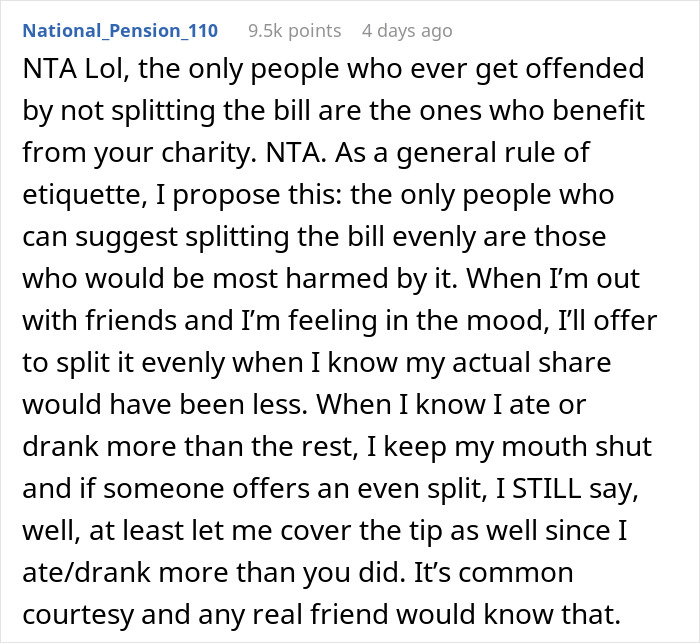

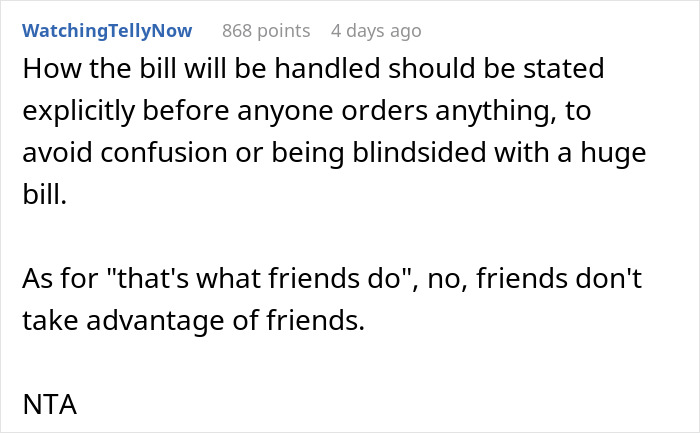
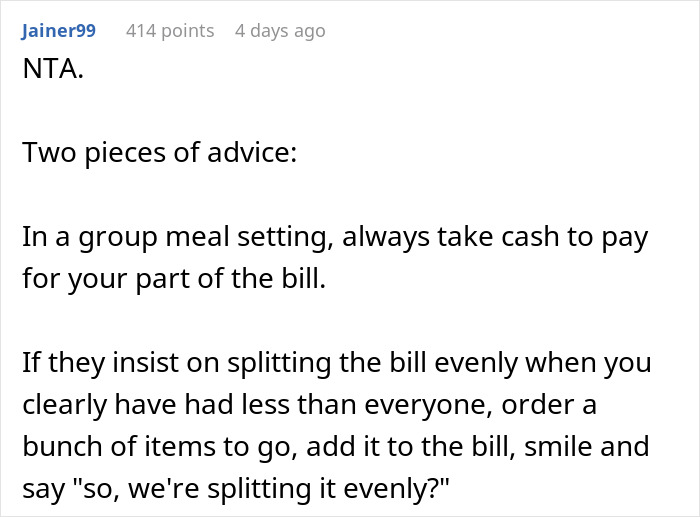
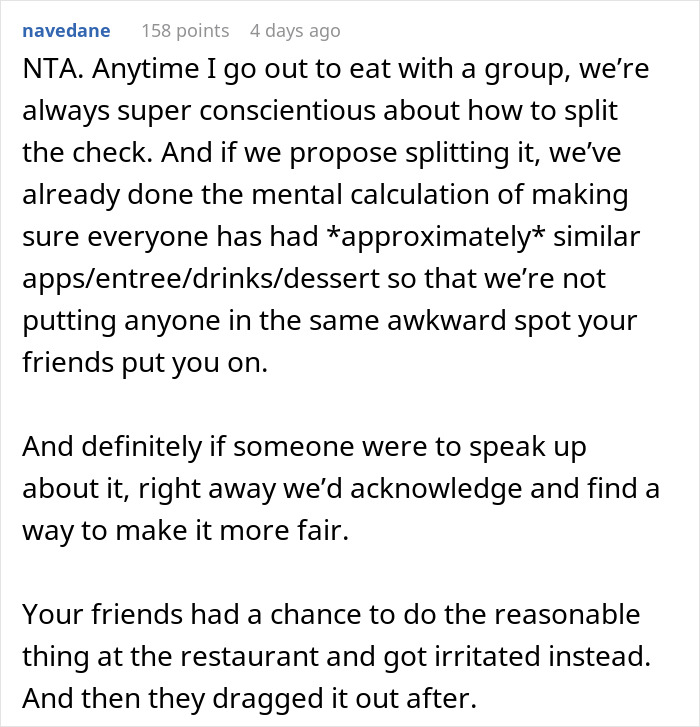
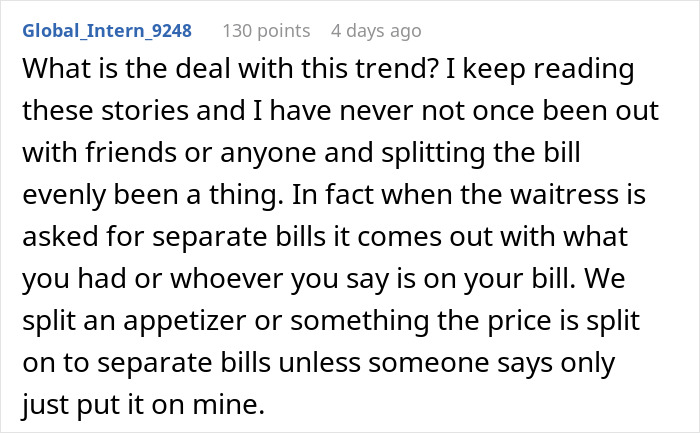
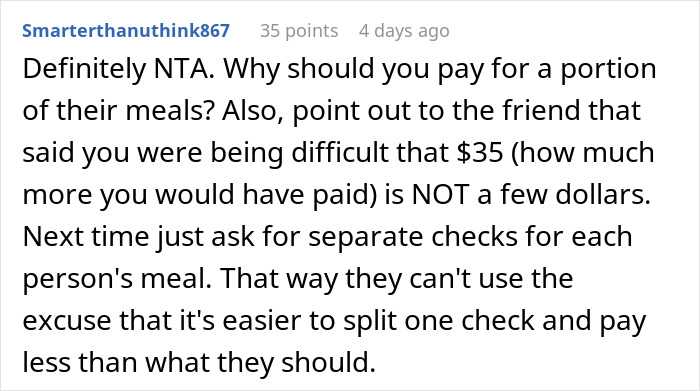
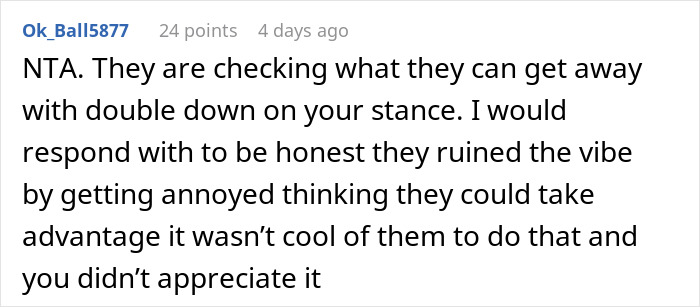
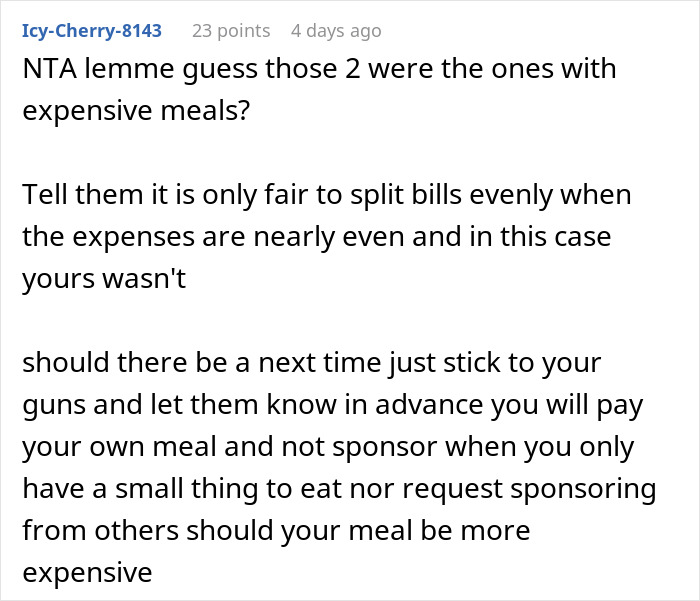
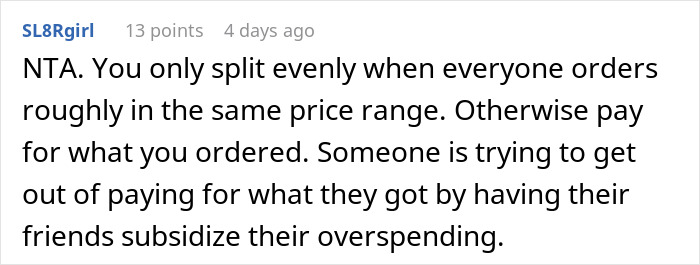
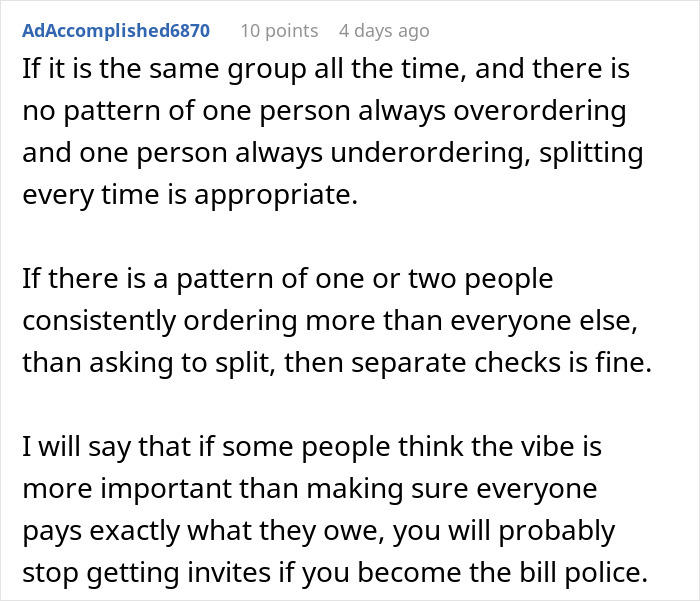
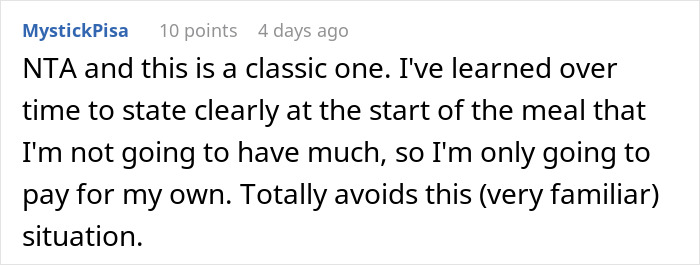


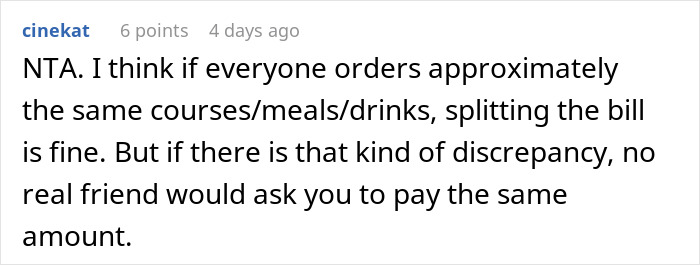
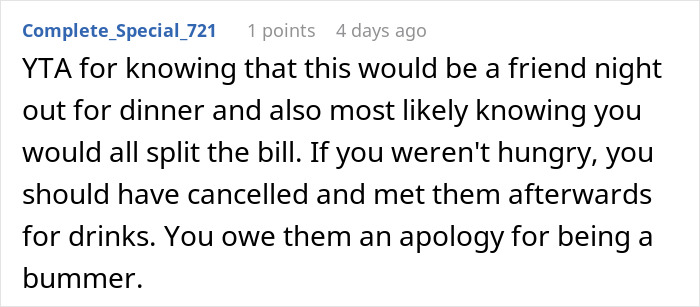

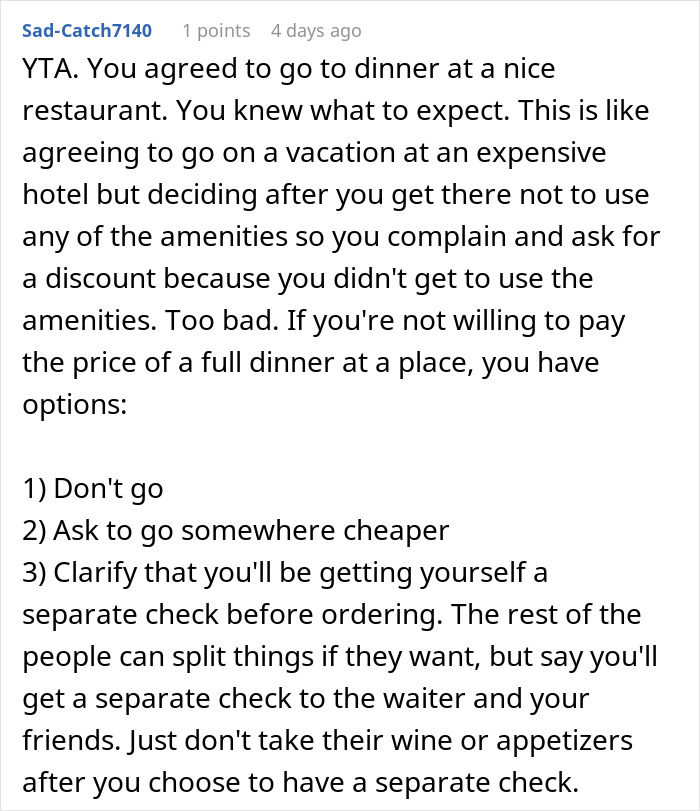
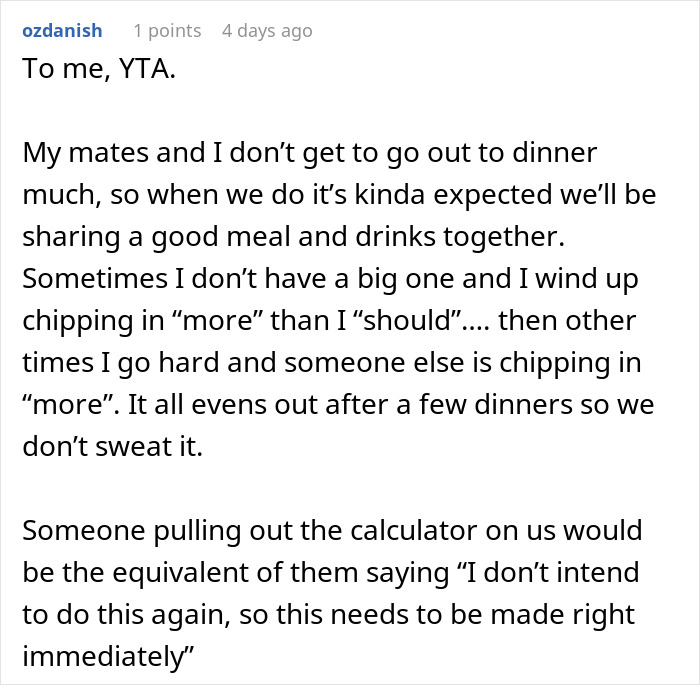
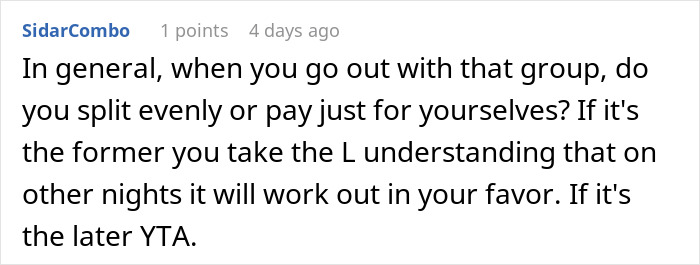

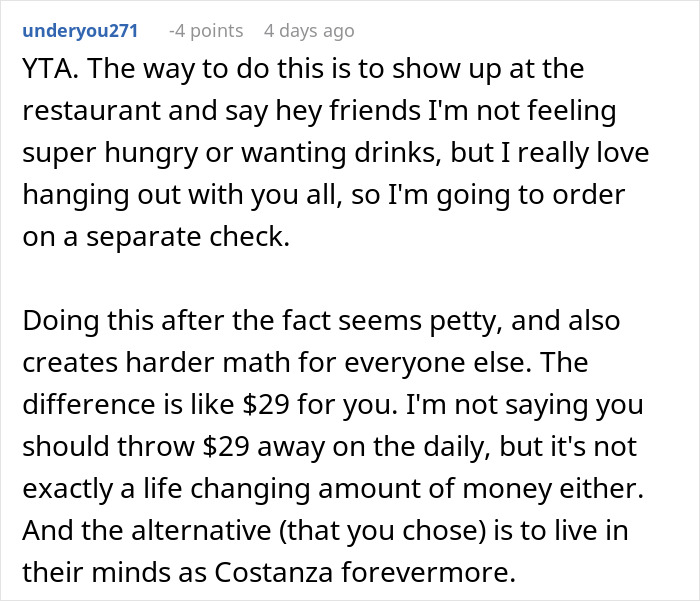












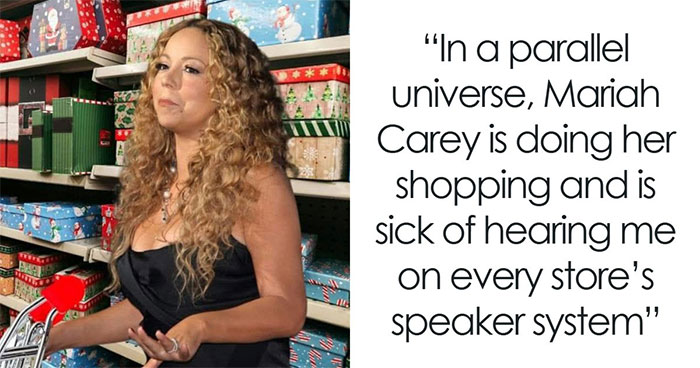































28
54